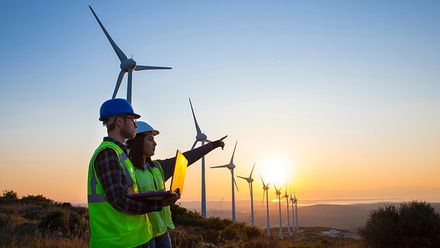Calls for political unity to achieve 'just and fair' energy transition
Report from Robert Gordon University (RGU) says UK and Scottish political decisions, rather than energy market economics, will determine the size of the workforce and supply chain.

The UN meaning of ‘just and fair’ is used, defined as ‘ensuring that no one is left behind in the transition to low-carbon and environmentally sustainable economies and societies’.
RGU says the ongoing decline in the oil and gas industry needs to be offset much more rapidly by identifiably greater levels of activity and higher UK content in renewables if any of the pathways to a ‘just and fair’ transition are to remain open.
Otherwise, interim steps will need to be taken to address the decline in activities, including oil and gas production - which is currently expected to reduce by more than 40% by 2030.
The report stresses urgent alignment across political spectrum to sustain UK offshore energy industry jobs, supply chain investments and the economic contribution of the workforce.
More than 6,560 pathways for the UK offshore energy industry were analysed, concluding that less than 15 (<0.3%) meet the credentials of a ‘just and fair’ transition by 2030.
And RGU highlights that even these limited scenarios require the renewables sector to attract billions of pounds of additional investment in the next six years.
Last year's levels were used as the benchmark, with the report saying that the UK must deliver around £10bln spend by 2030.
Professor Paul de Leeuw, Director of the Robert Gordon University Energy Transition Institute, says, 'The UK still has a unique opportunity to create a new energy future. Accelerating the re-purposing of the North Sea as a world-class, multi-energy basin will ensure the sector can power the country for decades to come. The prize for the UK to get this right is enormous.
'But to deliver this requires action and urgency, which means faster planning and consenting and access to the grid. We also need more flexible electricity pricing mechanisms to avoid project delays or cancellation, and a proactive focus on building UK content so we can design, manufacture, install, commission and operate some of the critical new infrastructure required.
'This, as well as building and maintaining the world-class skills and capabilities developed over the last few decades, will be crucial.'
He continues, 'While there is consensus across all stakeholders including governments, politicians, industry organisations and economic development bodies that we need to realise a ‘just and fair’ transition, a far more agile and joined-up approach is required to address how the country can best secure its energy ambitions, while addressing the cost-of-living crisis, managing energy security and delivering on the net-zero agenda.
'The latest research reinforces the need for urgent alignment across the political spectrum to agree the short-term actions that will deliver a just and fair transition, maintaining the workforce to 2030 to deliver a long-term net-zero future, and the associated economic benefits for the country.
'If the UK is unable to deliver close to 40GW (from 15GW at the end of 2023) of installed offshore wind capacity and UK content ambitions for the new activities by 2030, it is unlikely to retain the offshore energy workforce without additional activities.'








